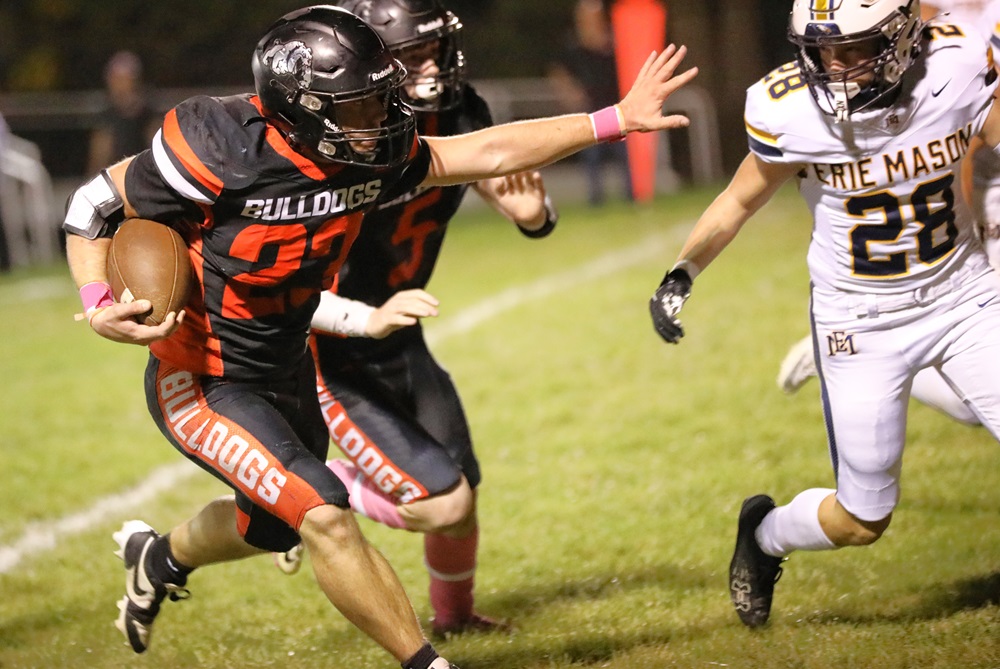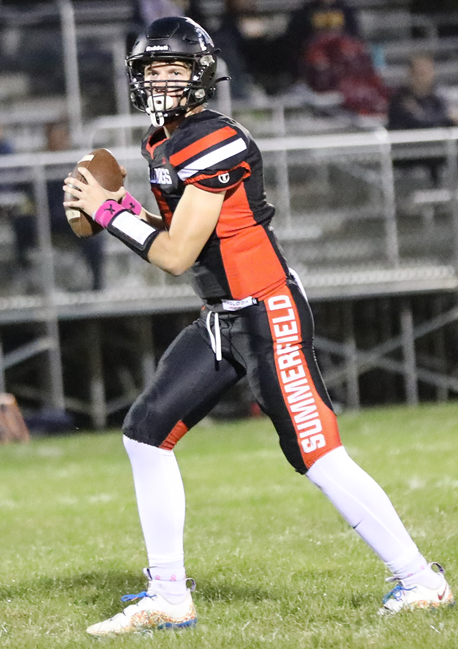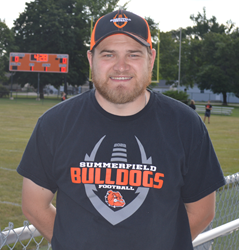
Writer-Turned-Coach Enjoys Debut
November 3, 2016
By Dennis Grall
Special for Second Half
ESCANABA — Sam Eggleston has seen high school football from two drastically different viewpoints. Now, even though he is an unpaid volunteer, he enjoys being on the sideline as a coach.
 Eggleston just completed his first season as a high school head coach, with Eben Superior Central winning its final three games to finish 4-5 in 8-player football. The Cougars were among the first teams in the state to join the 8-player format in 2010, their first year of football.
Eggleston just completed his first season as a high school head coach, with Eben Superior Central winning its final three games to finish 4-5 in 8-player football. The Cougars were among the first teams in the state to join the 8-player format in 2010, their first year of football.
Eggleston was a sportswriter before becoming a coach, giving him different perspectives to watching the same event.
The 1998 Rock Mid Peninsula High School graduate worked at newspapers in Escanaba, Kenai, Alaska; Northville and Novi, and Marquette before becoming a freelance writer and website blog editor in 2008. He started the writing phase of his career in 2000 with the Daily Press in Escanaba, under my direction.
He served as a volunteer assistant football coach in Northville, then moved back to the Upper Peninsula and became a volunteer coach at his alma mater in 2011 when the Wolverines went to 8-player football. He joined Superior Central in 2014 and spent two seasons as a volunteer aide until landing the head job just two weeks before the 2016 preseason began.
“In both careers … you took a shot on me and I ran with it, and the same with coaching; they gave me a shot and I’ve run with it as best I can,” he said.
In addition to his unpaid position at Superior Central, in rural Alger County, Eggleston is responsible for fundraising for the self-funded football program, a major priority for his offseason.
“My coaching is over (for the season) now and the majority of my time will be spent on raising funds so we can get new helmets, get new pads to replace ones that are broke, spending money we don’t have so we’ve got to make that up now,” he said. “We have to win now to have successful fundraisers.”
As a sportswriter, Eggleston would simply switch gears and move on to coverage of the next athletic season, for instance once fall sports moved into winter. He also never had to worry about how coaches managed off-field X’s and O’s once their seasons concluded.
Life was totally different as a reporter. “I had a different approach, different viewpoint, different mindset to a game as a writer,” said Eggleston, who still has the heft of when he was a lineman but now looks like a lumberjack with his bushy beard and build.
“Now I have to worry about every kid and every position,” he said. “Sometimes I don’t even see the end result of the play because I’m watching the line play. I don’t even know how well my running back did until I see where they moved the stick.”
He may also be working on an injured player while the game goes on, trying to make play calls and other decisions at the same time.
As a sportswriter, he would be jotting down notes between plays or perhaps checking the result of a picture he took of the previous snap, totally unaware the coach was monitoring several assignments.
“I look back at the writer I was and as a coach now, and I would hate the type of writer I was,” he said.
Eggleston would analyze why a coach would switch to running a sweep rather than the counter that had been working, all while the coach may be working on an injured player that caused a change in offensive plans.
“As a writer I never had the insight to see everything. I just saw the overall game and kept track of every yard,” he said. “As a coach I can’t even tell if the play went five yards because I have three plays stacked up as the game goes on.”
While he was writing sports in the metro Detroit area, his weekly paper often covered games also being covered by the Detroit Free Press or the Oakland Press, with those stories appearing the next day. Eggleston’s story would appear maybe five days later, after everyone knew what happened.
 “I had to come in with a different angle. I tried to be a little more analytical and focus on strategy versus the flourish and try to get the meat of the game rather than get to the flowery parts,” he recalled. “I tried to take a different approach and make my stuff more interesting.”
“I had to come in with a different angle. I tried to be a little more analytical and focus on strategy versus the flourish and try to get the meat of the game rather than get to the flowery parts,” he recalled. “I tried to take a different approach and make my stuff more interesting.”
His style apparently worked as the paper received several journalism awards and subscriptions remained strong.
Writing also provided some interesting backdrops. He had to use small charter planes to see some games in Alaska, or get to Nome to handle features about the Iditarod sled dog race.
He recalls covering a high school hockey game on an outdoor rink in Alaska and said “it was the first time I saw wind shear affect a hockey game.”
Eggleston also covered a football game where a kicker booted the ball off the uprights, then off a fence, and it bounced into the ocean in Homer.
He reported on a murder trial at that paper, where he would work the news desk in the morning, take time off and then handle sports at night. “It was super stressful,” he said.
Now walking the sidelines as a coach, he said “it definitely does feel like I’ve seen both sides of the coin, and I understand both sides of them better.”
He remembers just giving “little more rounded answers and (to) give both sides of the story” in postgame interviews. “A lot of coaches give canned answers. I try to be a little more in-depth and help try to write the story.”
In his early days as a sportswriter, he said “I would see the game unfold and see the pressures and why a coach would make a decision to go for it (on fourth down). I was a bit more critical of the coach and their decision,” he said, adding “I would probably have been a little more biting about it when I wrote the story.”
He admits in those days “I thought I knew everything there was to know about football. I played it,” he said. “I always approached the game like I was the professional and knew everything about the game. Now as a coach there are a host of responsibilities during every game. I am in completely different waters now. The hardest thing is keeping the kids pointed in the right direction as things go wrong.
“You’ve got the entire team and you’ve got to keep moving in a positive direction, keep the focus going forward. Forget the last play and work on the next one and get the kids to buy into that philosophy.”
He also compares his first writing assignment at the Daily Press with his first game this season at Ontonagon. “I did a (men’s baseball) story about the Escanaba Polecats, and you read my first line and said, ‘Did Yoda write this?’ I thought, oh my God, I don’t know what I’m doing.”
The Cougars lost their opener this fall 36-8, and Eggleston said “after being an assistant for four years, I still wasn’t prepared going into that Ontonagon game. We lost, and as I look back, if we played them right now I think we would beat them.
“I had no clue coming into that first game and didn’t have any idea how to get us back on track.”
He eventually figured enough out to finish 4-5 and found plenty of ways to enjoy being a coach.
Eggleston tries to eat lunch with his players every day, and he pays for his own meal.
“I want a family environment there; we all sit at the same table,” he said. “What I get back is relationships I never had before. I feel like I have 21 kids, and I love every minute of it.”
 Denny Grall retired in 2012 after 39 years at the Escanaba Daily Press and four at the Green Bay Press-Gazette, plus 15 months for WLST radio in Escanaba; he served as the Daily Press sports editor from 1970-80 and again from 1984-2012. Grall was inducted into the Upper Peninsula Sports Hall of Fame in 2002 and serves as its executive secretary. E-mail him at [email protected] with story ideas for the Upper Peninsula.
Denny Grall retired in 2012 after 39 years at the Escanaba Daily Press and four at the Green Bay Press-Gazette, plus 15 months for WLST radio in Escanaba; he served as the Daily Press sports editor from 1970-80 and again from 1984-2012. Grall was inducted into the Upper Peninsula Sports Hall of Fame in 2002 and serves as its executive secretary. E-mail him at [email protected] with story ideas for the Upper Peninsula.
PHOTOS: (Top) Eben Junction Superior Central football coach Sam Eggleston speaks with some of his players during a game this season. (Middle) Eggleston monitors the action on the field. (Photos by Dennis Grall.)

Sparked by Offense Switch, Summerfield Sets Record-Breaking Scoring Pace
By
Doug Donnelly
Special for MHSAA.com
October 29, 2024
Dylan Szegedi might only be in his second season as a head varsity football coach, but he knows when to pull the plug on an offensive scheme.
 A change from the veer to a version of the gun-T has been the catalyst behind Petersburg-Summerfield’s 8-1 season, the best at the Monroe County school in more than a decade.
A change from the veer to a version of the gun-T has been the catalyst behind Petersburg-Summerfield’s 8-1 season, the best at the Monroe County school in more than a decade.
“I really love the veer. I’ve seen it work very well,” Szegedi said. “It just didn’t work for us. We always say we were trying to put a round peg through a square hole. It just didn’t jell with our guys, and we were smart enough to realize it.”
The Bulldogs went 5-4 last season but missed the playoffs for the second straight. With several second- and third-year starting seniors back, Szegedi decided to change offenses despite having spent nearly all his years coaching the veer. He and his coaching staff started researching offenses and landed on one that is the mastermind of a coach in Alabama that puts a lot of YouTube videos together and travels around the country talking about his offensive concepts.
“This offense is perfect for our guys,” Szegedi said. “It’s a good mix of running and passing. It’s a good mix of spread but still some downhill-style run concepts. It fits our athletes to a T. It is a spread-T concept, wing-T running concepts with a spread flair to it. It was exactly what we needed.”
Heading into Friday’s home Division 8 playoff game against Manchester – the first hosted by Summerfield since 2015 – the Bulldogs are one point shy of the school record for points scored in a season. Since a 20-14 win over Ottawa Lake Whiteford in Week 5, Summerfield has scored 48, 62, 70 and 58 points in victories. The 70 points against Vanlue, Ohio, was a single-game school record.
 “It’s come together seamlessly. The proof is in the pudding. We have done great, and hopefully we will continue to do so,” Szegedi said.
“It’s come together seamlessly. The proof is in the pudding. We have done great, and hopefully we will continue to do so,” Szegedi said.
The new offense suits quarterback Trace Secor much better.
“I like this one,” Secor said. “It fits our style of play and the players we have. It complements us.”
Secor has passed for 1,248 yards and 21 touchdowns.
Senior receiver Tyler Dafoe has 743 yards and 12 touchdowns receiving. Bruising tight end Brenden Myshock has six touchdown receptions, and big-play Eli VanHuysen has caught 18 passes for 391 yards and another six touchdowns.
Senior running back Mitchell Gomulinski has had a tremendous season as well. Through nine games, he has rushed for 1,398 yards, averaging more than nine per carry. He has scored 17 touchdowns.
“Mitchell is he is our emotional leader,” Szegedi said. “He keeps everybody going and is the guy the other people look for to set the example. He’s worked very hard. I’m just proud of what he was able to do.”
The Summerfield defense has been rock-solid too. Since halftime of the Whiteford game, the Bulldogs have allowed just two touchdowns over 18 quarters. Gomulinski has 80 tackles. Dafoe and Gabe Ostrosky have five interceptions apiece.
The biggest win came against Whiteford, which played in MHSAA Finals in 2022 and 2023. It propelled the Bulldogs to the Tri-County Conference championship.
“When we beat Whiteford, that really changed the attitude of a lot of our guys,” Szegedi said. “Not that they didn’t believe before, but after that victory, I think we just started believing even more. It gave them affirmation that if we could beat them, we could hang with anybody. It gave them the belief that, ‘Hey, maybe we are pretty good.’”
The community has rallied behind the team. At a watch party Sunday when the MHSAA released the playoff pairings, about 150 parents, students and other community members met in the high school cafeteria.
 “There is talk about how they are going to decorate the town and decorate the stadium,” Szegedi said. “Last Friday the stadium was packed. That’s the way it should be.”
“There is talk about how they are going to decorate the town and decorate the stadium,” Szegedi said. “Last Friday the stadium was packed. That’s the way it should be.”
The Oregon, Ohio, native graduated from Toledo St. Francis in 2011 where he played football and was on the Knights swim team. He then continued at Wayne State University and was a two-time Division II national champion diver, earning All-America honors eight times. He was the Great Lakes Intercollegiate Athletic Conference Diver of the Year multiple times and was inducted into the Wayne State Athletic Hall of Fame.
After college he came home and decided he wanted to get into coaching football. He called his former freshman coach at St. Francis, Geoff Skibinski, and joined the coaching staff.
Since then, he and Skibinski have coached at multiple stops together. When Szegedi was hired at Summerfield in 2023, his first call was to Skibinski, who runs the Summerfield offense.
“He and I work well together,” Szegedi said. “We have a good trust in one another.”
Summerfield’s 8-1 record is the best for the school since 2010, which was also the last time the Bulldogs won a conference championship.
Szegedi is glad to see the success the 11 seniors are enjoying.
“These are guys who have played a ton of varsity football,” he said. “It’s fun to see all of the time they spent in the summer running and all of the extra lifting pay off. They are guys who deserve it. They’ve worked very hard and deserve the success they are now experiencing.”
 Doug Donnelly has served as a sports and news reporter and city editor over 25 years, writing for the Daily Chief-Union in Upper Sandusky, Ohio from 1992-1995, the Monroe Evening News from 1995-2012 and the Adrian Daily Telegram since 2013. He's also written a book on high school basketball in Monroe County and compiles record books for various schools in southeast Michigan. E-mail him at [email protected] with story ideas for Jackson, Washtenaw, Hillsdale, Lenawee and Monroe counties.
Doug Donnelly has served as a sports and news reporter and city editor over 25 years, writing for the Daily Chief-Union in Upper Sandusky, Ohio from 1992-1995, the Monroe Evening News from 1995-2012 and the Adrian Daily Telegram since 2013. He's also written a book on high school basketball in Monroe County and compiles record books for various schools in southeast Michigan. E-mail him at [email protected] with story ideas for Jackson, Washtenaw, Hillsdale, Lenawee and Monroe counties.
PHOTOS (Top) Petersburg Summerfield’s Mitchell Gomulinski (23) prepares to take on a defender from Erie Mason this season. (Middle) Bulldogs quarterback Trace Secor considers his options from the pocket. (Below) Summerfield coach Dylan Szegedi. (Action photos by Kendra Dafoe; Szegedi photo by Doug Donnelly.)

